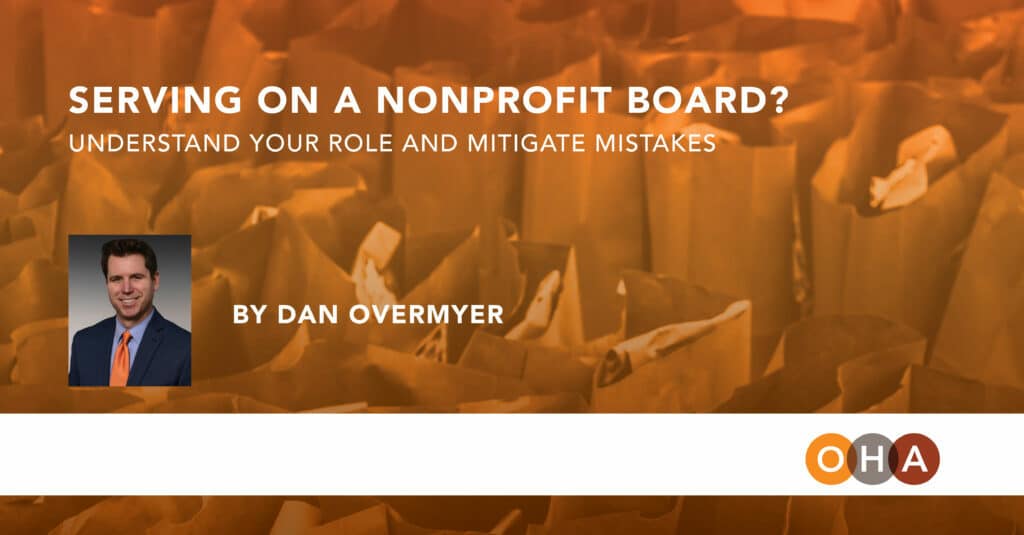
The board of directors is the governing body of a nonprofit responsible for advancing the organization’s mission by creating and implementing ethical policies. These policies should contribute to the nonprofit’s culture, strategic focus, effectiveness and financial sustainability. The board must also fulfill legal duties and serve as a fiduciary of the organization’s assets.
As board members navigate the above responsibilities, there is plenty of opportunity for error. However, with the proper risk management guidelines, mistakes can be prevented or minimized.
This article discusses the potential mistakes the board of directors of a nonprofit can make and how to mitigate them.
Potential Mistakes
Mistakes made by the board can affect not only the organization but its stakeholders and community as well. Common errors committed by the board of directors include:
- Failure to understand or abide by their fiduciary duties—The board has three primary legal duties they must follow: duty of care, loyalty and obedience. Failure to fulfill those duties can open up the board and organization to liabilities and increased scrutiny from
- Failure to provide effective oversight—It is the fundamental responsibility of the board to give direction and accountability to the organization, including reviewing financial statements and the annual Form 990. Without sufficient oversight, governance policies—including conflicts of interest, executive compensation and whistleblowers—may be neglected.
- Improper conflict management—A mistake involving a conflict of interest can be detrimental to the organization, ethically and legally. Conflicts that aren’t managed can result in significant penalties against the organization and the party that benefits.
- Failure to follow proper laws for tax-exempt entities—Boards must be aware of and follow all federal, state and local laws that apply to the nonprofit. They must also be conscious of whether the organization is a private foundation, public charity, supporting organization or another form of tax-exempt entity.
- Lack of diversity—A diverse board of directors offers improved decision-making, increased engagement and enhanced business practices. A board that lacks diversity opens itself to liabilities that may arise from blind spots that aren’t being addressed.
- Failure to protect confidential information—Airing grievances outside the boardroom threatens the effectiveness of nonprofit governance. After an issue is put to a vote, disagreeing board members should still present a united front to the public.
- Failure to recruit board members with due care—Board member recruitment and selection should be based on candidates’ qualifications and expertise. When board members are chosen because they are friends, relatives, business associates or wealthy individuals, they may not be engaged, provide oversight or govern with independent judgment.
- Failure to educate board members—The board should understand their roles and duties and that inaction could be perceived as misconduct.
- Failure to document and retain records—Failing to document and retain records may lead to information being lost, as well as legal ramifications.
- Lack of focus on the organization’s mission—The nonprofit’s mission should always be at the forefront of decisions made by the board. Board members shouldn’t push projects that aren’t in line with accomplishing the mission.
Mitigating Mistakes
Board members should be committed to furthering the nonprofit’s mission while avoiding mistakes and mitigating liabilities. To combat the above errors, leadership should:
- Complete training on fiduciary duties. Fiduciary duties protect the nonprofit and board from legal risks and reputational damage, so educate the board on their legal responsibilities to ensure they are carried out.
- Develop policies and procedures for performing oversight. To provide effective leadership, various governance policies must be developed and implemented. Delegate development to governance committees, such as those that oversee finances, investments, audits and compensation.
- Have a reporting system for conflicts of interest. There should be a written policy to ensure board members disclose any conflicts before deliberations or votes. State that the interested party does not participate.
- Conduct ongoing board training on tax exemption. Board members should understand the repercussions of overpaying key employees, engaging in excessive lobbying, accommodating tax shelter transactions, making bad bargains on behalf of the nonprofit and the impact of failing to pass the public support test. Board orientation and ongoing training can help avoid penalties imposed by Congress and local governments.
- Develop diverse and inclusive recruitment. Determine what professional skills, expertise and cultural backgrounds are absent from the board and direct recruitment efforts toward filling those gaps.
- Train members on confidentiality. Conflicts that occur in the boardroom should remain there. Following a vote, if a board member is in vehement disagreement, they may consider resigning. If it appears the nonprofit’s rights are being violated, board members may come together after a vote to bring a derivative suit forward.
- Recruit with due care. Implementing due care policies during the recruitment and selection process can ensure that members are chosen based on their merits and how they can help advance the organization’s mission, not simply because they know someone within the organization.
- Educate board members. Make sure board members understand the organization’s purpose, their duties and what’s expected of them. The president, chair and executive director should correct any misunderstandings by conducting orientation with a nonprofit lawyer present and regularly informing board members about major issues.
- Implement policies for documentation and retention. Nonprofits should have a policy outlining record and document retention, and all records should be kept until the statute of limitations is reached. A CPA or licensed attorney can assist in creating a policy to protect the nonprofit from any legal liabilities.
- Keep organizational goals in mind. Don’t push ideas that aren’t in line with accomplishing the overall mission of the nonprofit.
Mistakes can pose reputational and legal risks to nonprofits. By implementing good governance practices, mistakes can be minimal, and the nonprofit can ensure it’s compliant with all laws and regulations. For more risk management guidance, contact us today.